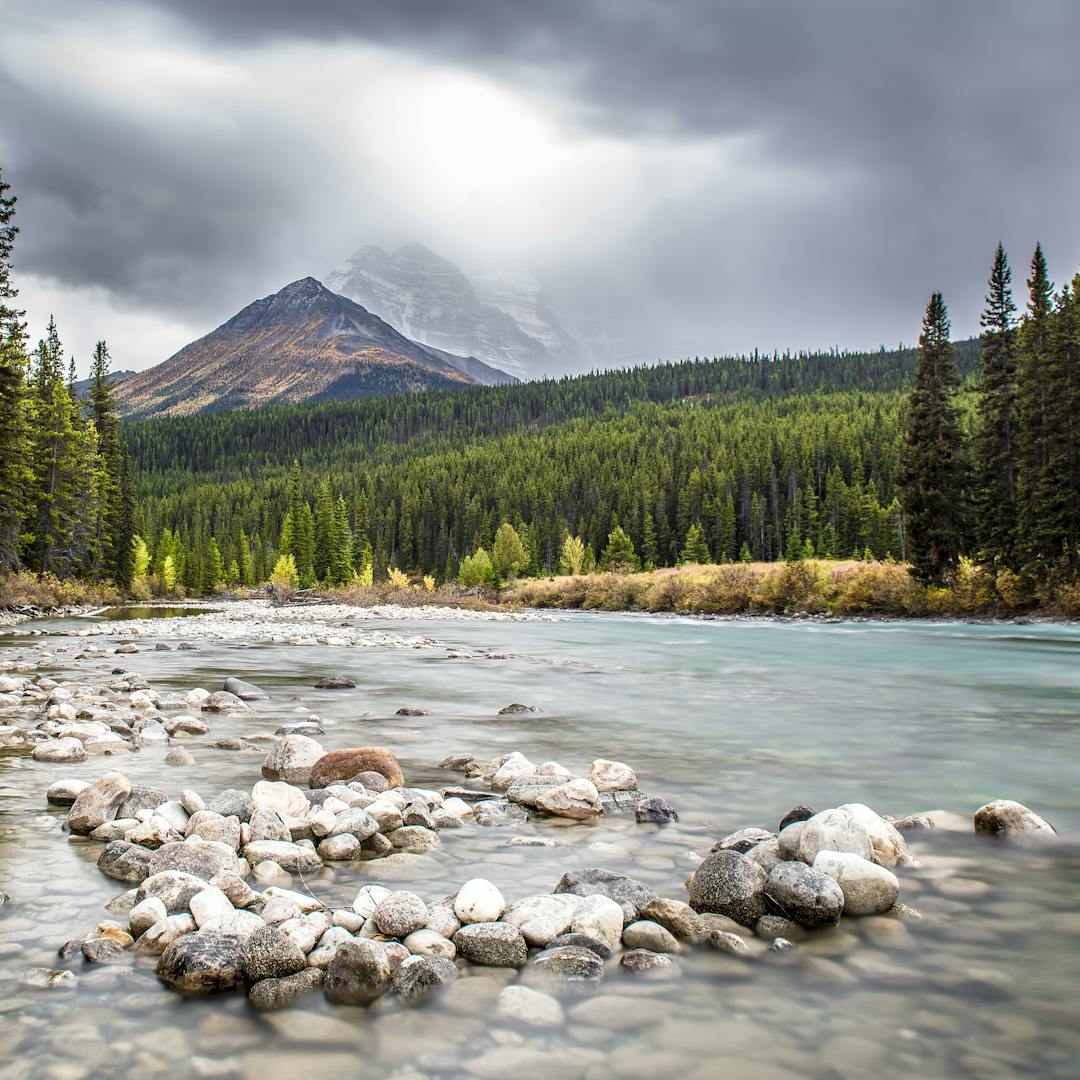If you’re going to be moving, you want to make sure it’s in the right direction.
Now it’s time to hold on to your compass and watch how all roads lead to Alberta.
This lovely province is the 4th largest in Canada with a population of about 4.8 million people. Because of its stunning scenery and a plethora of stunning yet affordable homes, many house hunters find themselves drawn to Alberta. While it is indeed the sunniest place in Canada (2,300 hours of sunshine per year!) with endless pros for its residents, living here doesn’t always feel like sunshine as it does come with a few cons.
Interested in calling Alberta your new home? Don’t make the big move until you read our guide to the pros and cons of living in Alberta.
Table of Contents: Should I Move To Alberta?
1. Should I Move to Alberta? | The Pros
- Higher Salaries
- Affordable Properties
- The Wide Availability of Brand-New, Quick Possession, and Move-In Ready Homes
- Lower Taxes
- Affordable and Accessible Healthcare
- Strong Job Market
- The Jaw Dropping Scenery
2. Should I Move to Alberta? | The Cons
- Long and Rough Winters
- It’s Landlocked
- The Province’s Need for Better Roads
3. Let Your Compass Lead You To Kinniburgh South
Should I Move to Alberta? | The Pros
1. Higher Salaries
Did you know that employees in Alberta benefit from higher wages compared to other provinces in Canada? In the last quarter of 2023, the average salary in Alberta was an impressive $67,247.96, which was the highest average salary among all provinces. On average, an employee in Alberta can generate an income of about $1,150 to $1,200 per week.
Alberta’s $15 Minimum Wage Initiative
One significant milestone for Alberta is being the first province in Canada to implement a $15 minimum wage back in 2018. This initiative was introduced to ensure fair compensation for workers and improve their standard of living. At the time, this minimum wage was also the highest in the country, showcasing Alberta’s commitment to providing better income opportunities to its workforce.
Overall, Albertans enjoy prosperous employment prospects with higher-than-average wages across various levels of work experience. The introduction of a $15 minimum wage emphasized Alberta’s dedication to ensuring fair compensation for its workers while signaling advancements toward improving overall income distribution across Canada.
2. Affordable Properties
Looking to buy a home in Alberta? You’d be ecstatic to know that properties are a lot more affordable here compared to other Canadian provinces.
As of December 2023, the average home price in Alberta (single-family homes) was around $450,000—which is around half the price of similar properties in neighbouring areas.
At the same time, rent costs are also much lower for most cities in Alberta. The average rate stands at approximately $1,266.00
3. The Wide Availability of Brand-New, Quick Possession, and Move-In Ready Homes
Not only is Alberta affordable in terms of housing costs, but it also boasts a wide availability of brand-new, quick-possession, and move-in-ready homes. To top it all off, these properties are located in top-tier communities featuring stunning amenities.
Kinniburgh South: The Top Choice For Those Looking To Buy A Home In Alberta
Kinniburgh South is one such place in Alberta that offers large lots, dedicated green spaces, and easy lake access where you can enjoy boating, swimming, fishing, skating, and sledding. Combining a serene, small-town atmosphere and all the amenities of big-city living, Kinniburgh South truly offers the best of both worlds. This quiet, family-friendly community will feature over 350 homes upon completion—and it’s ready to welcome you home.
Click here to learn more about our quick possession homes in Alberta.
4. Lower Taxes
Alberta’s tax landscape offers significant advantages for its residents, including the following:
- an absence of a provincial sales tax (PST) on everyday purchases
- exemption from paying provincial healthcare premiums
- a flat income tax rate applied to all income levels–which means that higher earners may find Alberta’s tax structure advantageous, as they don’t face progressive taxation that would significantly increase their overall tax liability
5. Affordable and Accessible Healthcare
Alberta residents can benefit from extensive coverage through the publicly funded Alberta Health Services (AHS), which offers a wide range of medical services such as doctor visits, hospital care, and prescription medications. This allows individuals to seek medical attention without worrying about high costs or being denied essential care. In fact, AHS is known as the “largest integrated provincial health care system” in Canada.
Uplifting its health care system further, there are also 106 acute care hospitals in the cities in Alberta.
6. Strong Job Market
In September 2023, it was reported that, over the past three months, Alberta gained 10,200 jobs each month, on average. That same month, reports also revealed that the Alberta labour market outperformed the rest of the country in terms of job gains over the past 12 months.
Overall, job gains in the province were mainly in the private and self-employed sectors. The goods-producing sectors, such as construction, manufacturing, and natural resources also continue to flourish in terms of higher employment numbers. This points out the high possibility that cities in Alberta will continue to offer great employment opportunities.
7. The Jaw-Dropping Scenery
If you’ve been asking yourself “Should I move to Alberta?” it’s likely that this province’s gorgeous scenery will make you start packing, stat. Alberta is a treasure trove of natural beauty that won’t fail to take your breath away. The province boasts an incredible variety of landscapes that cater to every outdoor adventurer’s dream.
Starting from the mesmerizing prairies in the south, where the golden wheat fields stretch as far as the eye can see, to the awe-inspiring Rocky Mountains in the west, Alberta offers a visual feast like no other. Did we also mention it’s home to 245 rivers and over 600 freshwater lakes that contribute to its nature-centred aesthetics?
The wide-open spaces of Alberta give you a sense of freedom and make you feel at one with nature—making it the perfect home for those who value the importance of a profound connection between humans and the environment. At the same time, this also paves the way for a healthier lifestyle!
Alberta’s Unesco World Heritage Sites
Just when you thought its resume couldn’t get even more jaw-droppingly impressive, Alberta also features six UNESCO World Heritage Sites, including the following:
- Canadian Rocky Mountains
- Dinosaur Provincial Park
- Head-Smashed-In Buffalo Jump
- Wood Buffalo National Park
- Waterton-Glacier International Peace Park
- Writing-on-Stone / Áísínai´pi
Should I Move to Alberta? | The Cons
1. Long and Harsh Winters
Alberta is known for having long and harsh winters. Winter temperatures set in as early as mid-October and linger until late April. Those living in the Rockies or in areas further up north typically experience the most intense conditions of the cold season. However, cities in Alberta do have lower levels of snowfall and low humidity levels as well—but that doesn’t mean that the chilly temperatures won’t demand to be felt by your bones.
On the bright side, Alberta is the sunniest place in Canada—having twice as many sunny days a year versus the national average. So when the summer months come to say hello, you can take advantage of embracing Alberta’s natural wonders through camping, hiking, boating, and a bunch of other outdoor activities.
2. It’s Landlocked
Did you know that there are only two landlocked provinces in Canada? Saskatchewan, and you guessed it…Alberta.
The eastern part of this province is occupied by the Great Plains, while the western area is bordered by the Rocky Mountains. As such, Alberta doesn’t have any beaches, oceans, or open water on its map. So, if spending your summers by the beach is your idea of a weekend well-spent, you will need to travel quite far out of the province to do just that.
3. A Lack of Road Maintenance
Rounding up our list of the pros and cons of living in Alberta is the province’s road conditions.
Back in 2019 to 2020, about 15% of Alberta’s provincial highway surfaces were reportedly in “poor” condition, which means that major repairs or replacements were needed. Whereas 26% of Alberta’s highways were in “fair” condition and nearing the end of their lifecycle. Only 59% of the provinces were deemed to be in “good” condition and will be able to provide continued service with average maintenance.
Let Your Compass Lead You To Kinniburgh South
Still asking yourself “Should I move to Alberta?” Well, this is the sparkly neon “yes” sign you’ve been waiting for. With its affordable properties, higher salary rates, job opportunities, impressive healthcare, and gorgeous scenery, we know you can hear this amazing province calling your name.
Where’s your compass pointing toward now? We have a feeling it’s in the direction of Kinniburgh South in Alberta, a family-friendly community that gives you the best of both worlds: a serene view of nature and easy access to big-city amenities.
Ready to buy a home in Alberta? Talk to us today to learn more.



